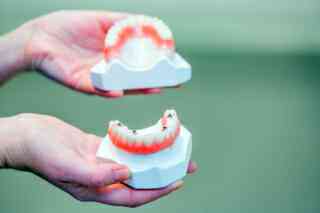Tips for Getting Used to Dentures
How to Get Used to New Dentures Faster
For those who are new denture wearers, it is not uncommon to experience oral discomfort. And for patients who are experiencing this discomfort, it can often be tempting to not wear them, but it is important to remember that wearing dentures and getting used to how they feel can be vital for patients’ oral and overall health. The good news is wearing dentures does not have to be uncomfortable, and there are some helpful tips patients can use to help them get used to their dentures and prevent any discomfort.
Know What to Expect
At first, dentures will likely feel like a strange or foreign object in the mouth, not unlike wearing braces or a retainer. There will be a period of time when patients need to learn how to eat and speak naturally when wearing their dentures, and it is normal for them to experience discomfort or shock during this process. It is important to realize this transition period takes time, and the discomfort and possibly any slight embarrassment of wearing dentures does not last forever.
Give Your Cheeks Some Exercise
Cheek muscles, also known as buccinator muscles, help direct food within the mouth as it prepares to swallow. These muscles become more important for eating for patients who wear dentures, so working out these muscles a few weeks before starting to wear dentures can make a big difference. Professionals recommend engaging the muscles by keeping an exaggerated smile for a period of ten seconds at a time, engaging in this exercise a few times throughout the day.
Practice Speaking by Signing
Professional speech therapists have been using music to enhance speech for years. With this in mind, when patients are wearing their dentures, they can practice speaking with them by singing along with a song. By singing fluid, smooth phrases in a song, it can help patients get used to forming certain words with their new dentures, and practicing this a few times a day can make a big difference, helping the dentures feel less like an interference and more natural in the mouth.
Choose the Right Adhesive
There are a number of different dental adhesives on the market, and chances are a patient’s dental professional will let him or her know which ones are best. It is important to remember that this is not a “one size fits all” scenario, and if one adhesive does not work, feel free to experiment with other brands.
If you have any questions regarding the side effects of medication, you can always consult your dentist and sign up for our New Hampshire Individual Discount Dental Plan to save as much as 20 percent on all your dental bills. For more information, please click here.
Copyright: sergey02 / 123RF Stock Photo











